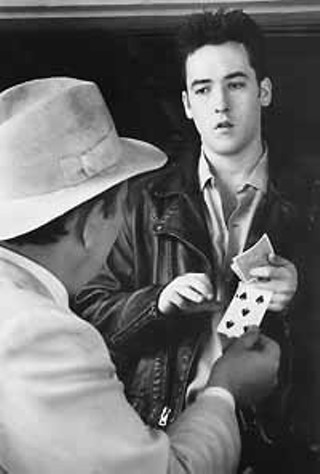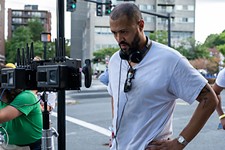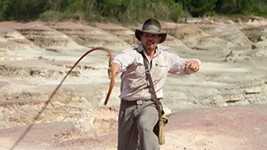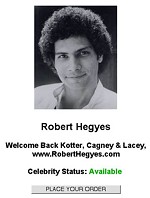
The Grifters
("Video Reviews" wishes to thank Encore Movies & Music, I Luv Video, Vulcan Video, and Waterloo Video for their help in providing videos, laser discs, and DVDs.)
While his Eighties peers have gone the troubled road of VH1's Where Are They Now?, John Cusack has been steadily building an astonishing résumé that includes practically every genre and every conceivable type of character. At 33 years old, Cusack has starred in over 40 films -- more movies than Sean Penn, the man commonly regarded as the best actor of his generation, and better movies than Tom Cruise, the man commonly regarded as the most successful actor of his generation.
So what is Cusack, then?
With his long, pale face smattered with freckles, his devious intelligence, and strangely private private life, Cusack has built a sustainable career playing his generation's Everyman -- able to pivot between playing both villain (The Grifters) and victim (Eight Men Out), hero of action (Con Air) and inaction (Bullets Over Broadway), leading man (Say Anything) and loser (Being John Malkovich). With this Friday's opening of High Fidelity, based on the charming Nick Hornby novel about a music fanatic who catalogs his life into top-five lists, Cusack puts another notch in his belt as co-producer -- a job he has also performed for films such as Grosse Point Blank and TV's The Jack Bull Story.
But I'll come clean here: I just love John Cusack.
EIGHT MEN OUT
D: John Sayles (1988); with John Cusack, Charlie Sheen, D.B. Sweeney, John Mahoney, Michael Rooker, Bill Irwin. When players on the Chicago White Sox agreed to take $10,000 each to botch the 1919 World Series, it may not have been the first time ball players threw a game, but it was the first time they were caught, big-time. The debacle resulted in the expulsion of eight men not just from the Sox, but from professional baseball altogether. In John Sayles' well-crafted period drama, which he adapted from Eliot Asinof's book, the national scandal begins with miserly owner Charles Comiskey, who consistently stiffs his talented team. Longing for their due, the boys join forces but soon find themselves way over their heads in bookies and backstabbing. They also must confront the reality of flubbing the craft they spent their lives honing -- the booing crowds, the white hot shame of knowing they could have saved the game, the media scrutiny. Cusack plays Bucky Weaver, who catches wind of the scheme but is too honest to go along with it and too naive to believe he'd be alone in that.
Eight Men Out is a baseball-history lovers' movie, and with so many characters (wearing the same uniform, no less), some viewers may find themselves scratching their heads while the drama's unfolding. But Cusack provides the hook. He is the good guy afraid to challenge the integrity of the game he lives and breathes, who stubbornly denies the reality of the situation, even when evidence to the contrary parades all around him. And he represents the promise stamped out by the players' betrayal and the man left forever wondering, like the rest of America: what if ...
THE GRIFTERS
D: Stephen Frears (1990); with John Cusack, Anjelica Huston, Annette Bening, Stephen Tobolowsky, J.T. Walsh. Cusack and
High Fidelity director Frears first joined forces on this hip noir, about three con artists and the violence and destruction they can't help but usher into each other's lives. Cusack trades in on his nice-guy image to play Roy Dillon, a two-bit con man pounding out a seedy life in Los Angeles. He dreams about leaving the biz, but the grift courses through his blood, so he keeps himself satisfied running small-time tricks. He lacks the ruthlessness of his mother Lilly, played by a chilling Anjelica Huston, who has spent her life running from one con to the next; he isn't even as scheming as his floozy girlfriend Myra (a breakthrough performance for Bening). Based on a pulp novel by Jim Thompson,
The Grifters is full of clever twists, sexy betrayals, and slick lines like, "He was so crooked he could eat soup with a corkscrew." Although it's easy to forget Cusack's performance amid the showy, Academy Award-nominated turns of his female co-stars, Cusack is once again the lynchpin, the character wanting so badly to believe that those around him are not lying -- and damned for being such a fool.
SAY ANYTHING
D: Cameron Crowe (1989); with John Cusack, Ione Skye, John Mahoney, Lili Taylor, Joan Cusack, Amy Brooks, Loren Dean. While cynical whippersnappers like Quentin Tarantino spent the Nineties making sincerity about as fashionable as blue eyeshadow, Cameron Crowe did the unthinkable: He made movies about men (and women) trying to find love. Crowe's characters are thinkers and dreamers, fishing for inspiration and purpose, good boys trying to be men -- whether they're Jerry Maguire bringing the love of the game back into sports or Steve Dunne trying to solve Seattle's traffic problem.
Say Anything's Lloyd Dobler is no exception. Although working from a trifle of a premise -- about a 19-year-old high school senior who falls for the untouchable class valedictorian -- Crowe makes this teen romantic comedy one of the best of its genre, with dialogue that is at once eerily familiar and brilliantly original. And in John Cusack, Crowe's self-aware writing seems to have found its perfect match ("Cameron and I used to say he was McCartney and I was Lennon," Cusack once told
Entertainment Weekly). Cusack's Lloyd Dobler is a complete original, brimming with quirks and schemes, one of those rare, uncompromising souls thoughtful enough to dream big and fearless enough to seize the day. "I'm looking for a dare-to-be-great situation," Dobler tells his high-school counselor (
Cheers' Bebe Neuwirth). "How many people really know what they want? A lot of them think that they know, but they don't know. I don't know, but I
know that I don't know." As explained by his best friend Corey (Taylor), Lloyd is also plagued, memorably, with that "nervous talking thing," which causes him to trot off course in jittery, conversational riffs on anything from kickboxing to growing up overseas. He is not really immature as much as he is childlike, unable to censor himself even though what he is saying may embarrass him, get him in trouble, or get him hurt. And it is that ability to tell the truth, to take a risk with his emotions, to say anything, that makes his character so unforgettable. "She gave me a pen," Cusack mutters in one of the film's most achingly honest scenes, Seattle rain pouring all around him. "I gave her my heart, and she gave me a pen."











